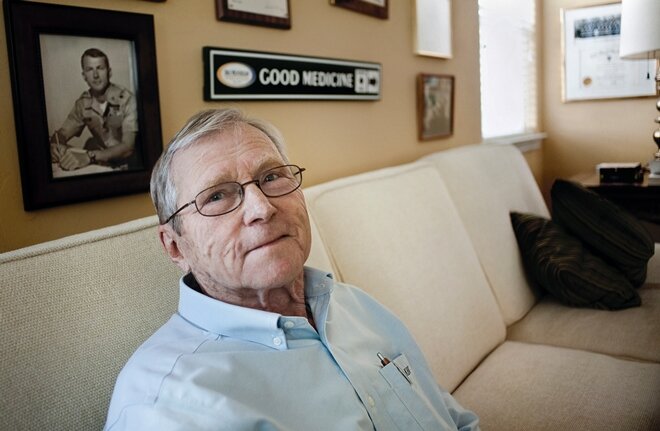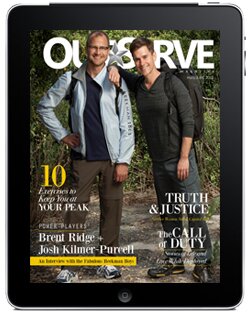Veteran’s Call
by Gene Barfield
This hero doesn’t have a name or a face. It has thousands. Between 1991 and now, thousands of LGBT veterans were instrumental in keeping the issue of justice alive for LGBT service members.

Brigadier General Keith H. Kerr entered the Army as a Private at Fort Ord, California in September 1953. Upon release from active duty in June 1960, he continued to serve in the Army Reserves and the California National Guard. General Kerr retired in June 1996 after 43 years of service to the United States and the State of California. -Photographs by Jo Ann Santangelo/Redux Images Visit www.joannsantangelo.com to view the entire gallery of Proud to Serve
Barney Frank was right in 1993 when he said what we did not want to hear. He said that the ban wouldn’t end until people got busy in their home congressional districts. Until enough people pounded on the local doors of their representatives and senators, educating them and demanding justice, repeal simply wouldn’t happen. Politicians needed to hear that their political safety would be jeopardized if they ignored the will of their constituents. In other words, this had to be a grassroots fight. All the beltway lobbying and Washington-based fundraising wouldn’t be enough to move the issue forward.
It is important not to marginalize the efforts in Washington to end the ban. It was an essential component of a fundamental political effort to make a political change. The other essential component, however, was hometown activism. Tip O’Neill, Speaker of the United States House of Representatives from 1977 until his retirement in 1987, rightly stated that all politics is local. With few exceptions, no legislator was going to vote to end the ban if it cost them their seat in Congress.
Alongside efforts in DC, successful repeal was possible because of 20 years’ worth of effort by people like Jim Darby (Chicago), Karl Clark (Fort Lauderdale), Nancy Russell (San Antonio), Ed Westrick (California), and thousands of other LGBT veterans working in their home towns around the country.
LGBT vets understood that active duty people had to be protected; those active duty members who wanted to come out to fight the ban were at great risk. After the implementation of “Don’t Ask, Don’t Tell” (DADT), it was no longer safe for them to come out as others had done while the fight to remove the ban on open service was being challenged – not that those earlier heroes had gotten off easy. For years, LGBT veterans were the only faces the issue had, because open service meant immediate discharge.

Lieutenant Colonel Vicki Smith joined the Oregon Air National Guard in 1976. She was a mission commander who served in Operation Dessert Storm. In 2004, her General recommended Vicki to be Unit Commander. When she decided to accept the position, a fellow officer threatened to out her to the General. She declined the position and retired in 2004. Vicki and Jeannie, her partner of 28 years, run a food pantry that services people living with HIV. -Photographs by Jo Ann Santangelo/Redux Images Visit www.joannsantangelo.com to view the entire gallery of Proud to Serve
People on the home front who led this fight are heroes. Many who never dared before to be out in their community got so mad at DADT that, suddenly, nearly every Gay Pride parade in the nation had a uniformed color guard. These citizens understood the significance of defending military veterans from their elected representatives, and they took action to speak out on their behalf. These citizens showed politicians that they can’t get reelected by slamming the door in the face of veterans, regardless of sexual orientation.
The visibility of LGBT veterans within the LGBT community and in the public places of the larger community may be ordinary now, but that presence evolved slowly. It wasn’t easy, but it was essential to ending the ban.
Early on, it wasn’t unusual for LGBT veteran activists to find only a tepid welcome in parts of the LGBT community. Many LGBT activists cut their teeth on Vietnam anti-war activism. Lingering anti-military sentiment prompted some to confront LGBT veterans who were raising awareness about the ban, insisting that LGBT people simply should not volunteer for military service. It took time to build bridges across the social divides within the LGBT community. It took on-the-spot hometown leadership by vets who were willing to engage and educate others about the facts and the impact DADT had on the thousands of LGBT service members and their families.
Public advocacy for an unpopular issue, one subject to displays of intolerance and hate, and fraught with strong emotions and factual misrepresentation, requires a great deal of courage. The first time an LGBT person speaks publicly, the first phone call or visit they make to elected officials, is a leap of faith, a demonstration of personal courage, and a willingness to risk a great deal in taking that step. Washington activism can be anonymous. Home town activism, however, is personal.
The confluence of events in 1993, including the fight to remove the ban (which resulted in DADT’s implementation) and the March on Washington, created an opportunity for the LGBT community to discover long-term couples of older generations. Many of our elders lived quiet lives at home, coming from a time and place where discretion and privacy were matters of survival. Increasing numbers of same-sex couples, whose relationships began as early as World War II, became visible to the rest of us when they chose to put real faces on the issues of justice and civil rights. Many of them are veterans.

Petty Officer Lisa Kove was an Aviation Storekeeper in the U.S. Navy from 1978-1982. She is presently the Executive Director of DOD FED GLOBE an educational national nonprofit that advocates for all Lesbian Gay Bisexual and Transgender (LGBT) employees of the Department of Defense.-Photographs by Jo Ann Santangelo/Redux Images Visit www.joannsantangelo.com to view the entire gallery of Proud to Serve
Older Americans, including LGBT people, are essential to the health and well-being of the nation. As a group, they vote regularly, participate in civic activities, and have a history of making time for things important to them. As we began to see older LGBT citizens taking part in civil rights activities, many have become stalwart examples of constancy and skill in local LGBT veteran organizations. They offer their time, their wisdom, and their income to ensure success of hometown efforts to educate and inform public officials about LGBT issues.
If not for two decades of local activism, today’s active duty anti-DADT activists would have encountered many of the same difficulties faced by their predecessors. Instead, DADT was successfully repealed, and a large part of the credit goes to our LGBT veteran activists. Unrestricted by DoD political activity policies, LGBT veterans on duty on the hometown front remain as important now as they’ve been before as we move forward on the equality front.
LGBT military veterans remain a source of experience, wisdom, knowledge, and constancy in their communities, in the state capitols and in Washington. They serve proudly on behalf of a new generation–the first generation–of actively serving LGBT service members. When you meet them, shake their hand. Tell them ‘thank you’ for refusing to give up, for refusing to accept defeat. Thank them for your freedom to serve openly.
___
An earlier version of this article was credited with the wrong author; the article has since been updated on the website and in the digital and print version of the Magazine.






